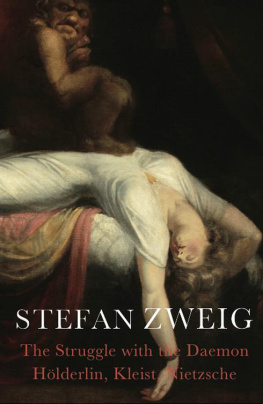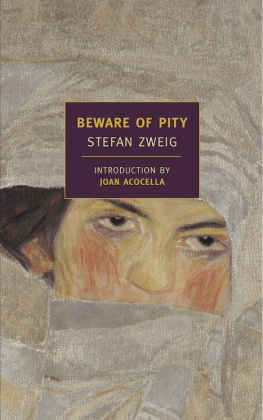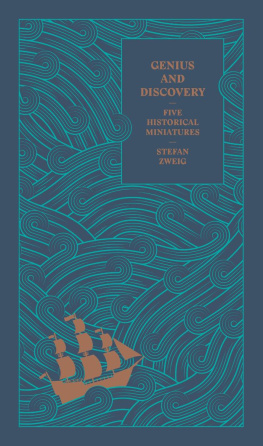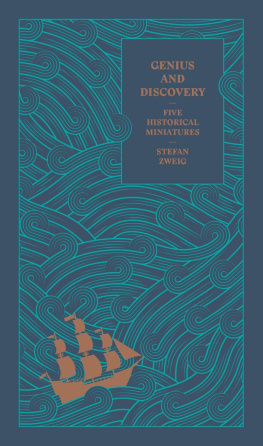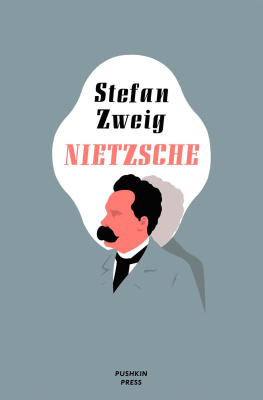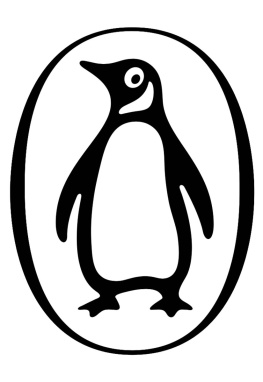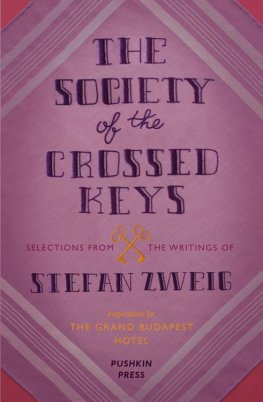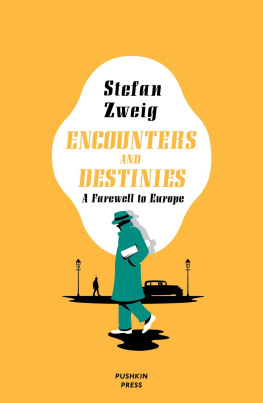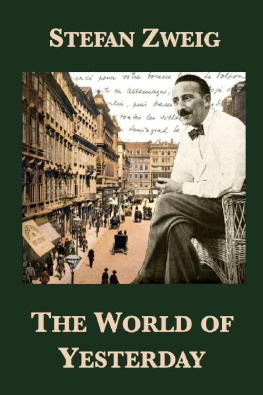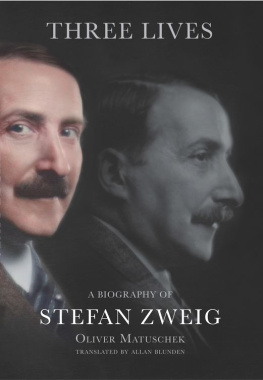The harder it has been for a son of earth to win to freedom, The more mightily does he stir his fellow men.
Conrad Ferdinand Meyer
In the present work, just as in my earlier trilogy Three Masters, three imaginative writers are portrayed in a way which will show their spiritual fellowship, but this essential unity is not to be represented with undue concreteness, or as going beyond an allegorical similitude. I am not looking for rigid formulae in which to confine the spiritual, but am disclosing the forms of the spirit. If in my books I deliberately assemble mentalities of like complexion, I do so only after the manner of a painter who likes to hang his pictures in such a room and in such a way that the working of light and counter-light shall bring out analogies of type. Comparison always seems to me a fostering, nay, a formative medium, and I rejoice in it because it is applicable without undue constraint. It enriches where the use of crude formulae impoverishes; it intensifies values inasmuch as it creates illumination by means of unanticipated reflections, and provides a margin of vacant space wherein to enshrine each likeness. This secret of plastic presentation was already known to the first great master of literary portraiture, Plutarch, who in his Parallel Lives gave paired descriptions of a Greek notable and a Roman, that behind their personalities the shadow counterpart, the spiritual type, might be made plain. Just as that illustrious writer worked in the field of historical biography, so do I design to work in the kindred field of literary and characterological biography. Three Masters and The Struggle with the Daemon are the opening volumes of a series dealing with Master Builders, or an Attempt at the Typology of the Spirit. Far be it from me to dream of forcing the inhabitants of the world of genius into the pigeonholes of a rigid system. Fired by a passion for psychological study and driven by a creative urge, I do but follow my bent towards the sculpturing of the figures of those to whom I am bound by the most intimate sympathies. By my own limitations, barriers are imposed against a striving for completeness; nor do I regret such fragmentary treatment, which would only be a source of grief to one who believed that creative work could be systematised, and who should arrogantly suppose that the infinite universe of the mind might be confined within definite boundaries. The thing that allures me in my plan is that it reaches out into infinity and knows nothing of frontiers. Thus it is that, at once slowly and ardently, with hands working in a way that still seems strange even to myself, I continue to build a chance-begotten edifice upwards into the little portion of time that hangs dubiously over the life of every mortal.
Hlderlin, Kleist and Nietzsche are obviously alike even in respect of the outward circumstances of their lives; they stand under the same horoscopical aspect. One and all they were hunted by an overwhelming, a so-to-say superhuman power, were hunted out of the warmth and cosiness of ordinary existence into a cyclone of devastating passion, to perish prematurely amid storms of mental disorder, and one of them by suicide. With no moorings in their own epoch, misunderstood by their generation, they flashed like meteors athwart the night of their mission. They themselves knew not whither they were bound, nor had they any grasp of their significance, as they hurtled towards the infinite in a parabola which seemed scarcely to touch our world of actualities. A power greater than theirs was working within them, so that they felt themselves rushing aimlessly through the void. In their rare moments of full awareness of self, they knew that their actions were not the outcome of their own volition, but that they were thralls, were possessed (in both senses of the word) by a higher power, the daemonic.
Daemonicthis word has had so many connotations imposed upon it, has been so variously interpreted, in the course of its wanderings from the days of ancient religious mythology into our own time, that I must explain the sense in which I shall use it in this book. I term daemonic the unrest that is in us all, driving each of us out of himself into the elemental. It seems as if nature had implanted into every mind an inalienable part of the primordial chaos, and as if this part were interminably strivingwith tense passionto rejoin the superhuman, suprasensual medium whence it derives. The daemon is the incorporation of that tormenting leaven which impels our being (otherwise quiet and almost inert) towards danger, immoderation, ecstasy, renunciation and even self-destruction. But in those of common clay, this factor of our composition which is both precious and perilous proves comparatively ineffective, is speedily absorbed and consumed. In such persons only at rare moments, during the crises of puberty or when, through love or the generative impulse, the inward cosmos is heated to boiling point, does the longing to escape from the familiar groove, to renounce the trite and the commonplace, exert its mysterious sway. At other times the average man keeps a tight hand on any stirrings of the Faustian impulse, chloroforming it with the dicta of conventional morality, numbing it with work, restraining its wild waters behind the dams of the established order. By temperament and training the humdrum citizen is an inveterate enemy of the chaotic, not only in the outer world, but in himself as well. In persons of finer type, however, and above all in those with strongly productive inclinations, the unrestful element is ever at work, showing itself as dissatisfaction with the daily round, creating that higher heart which afflicts itself (Dostoevsky), that questioning spirit which expands with its yearnings into the abysses of the limitless universe. Whatever strives to transcend the narrower boundaries of self, oerleaping immediate personal interests to seek adventures in the dangerous realm of enquiry, is the outcome of the daemonic constituent of our being. But the daemon is not a friendly and helpful power unless we can hold him in leash, can use him to promote a wholesome tension and to assist us on our upward path. He becomes a menace when the tension he fosters is excessive, and when the mind is a prey to the rebellious and volcanically eruptive urge of the daemonic. For the daemon cannot make his way back to the infinite which is his home except by ruthlessly destroying the finite and the earthly which restrains him, by destroying the body wherein, for a season, he is housed. He works, as with a lever, to promote expansion, but threatens in so doing to shatter the tenement. That is why those of an exceptionally daemonic temperament, those who cannot early and thoroughly subdue the daemon within them, are racked by disquietude. Ever and again the daemon snatches the helm from their control and steers them (helpless as straws in the blast) into the heart of the storm, perchance to shatter them on the rocks of destiny. Restlessness of the blood, the nerves, the mind, is always the herald of the daemonic tempestand that is why we call daemonic those women who diffuse unrest wherever they go and who open the sluices to let loose the waters of destruction. The daemonic bodes danger, carries with it an atmosphere of tragedy, breathes doom.
Thus it comes to pass that everyone whose nature excels the commonplace, everyone whose impulses are creative, wrestles perforce with his daemon. This is a combat of titans, a struggle between lovers, the most splendid contest in which we mortals can engage. Many succumb to the daemons fierce onslaught as the woman succumbs to the passion of the impetuous male; they are overpowered by his preponderant strength; they feel themselves joyfully permeated by the fertilising element. Many subjugate him; their cold, resolute, purposive will constrains his ardours to accept their guidance even while he animates their energies. Often the embrace which is a wrestle and the wrestle which is an embrace persist for a lifetime. In the artist and his work the great encounter becomes, as it were, symbolical; his every nerve is thrilled by the sensuous union between his spirit and its perpetual seducer. Only in the creative genius does the daemonic succeed in making its way out of the shadows of feeling into the regions of language and of light, and we discern the daemons passionate features most plainly in those who have been mastered by him, in the imaginative writers whom he leads whithersoever he willsin such as the three men I have chosen as most typical of their kind in the German worldHlderlin, Kleist and Nietzsche. For if in an imaginative writer the daemon of the Greeks, characteristic of the prophet and the pythoness. The measureless, the superlative, is the first unmistakable token of this form of artan unceasing endeavour to outdo oneself in the effort to reach that limitless sphere to which the daemonic properly belongs. Hlderlin, Kleist and Nietzsche were of the Promethean race which is in revolt against customary forms and tends thereby to destroy itself. The uncanny light of the daemon flashes from their eyes, and it is he who speaks through their lips. He continues, indeed, to speak through their lips when otherwise they would be dumb, and his strength makes itself manifest in them when nothing else remains to quicken the spirit and when the bodily forces are far advanced in decay. Never is the dread guest more plainly perceptible than when the mind of the host, rent asunder by formidable tensions, has collapsed, and the onlooker catches a glimpse of the inmost abysses where the daemon lurks. In all three of those whom this book concerns, daemonic strength (previously veiled) became conspicuous when the guiding intelligence of the ordinary self had tottered and fallen.

